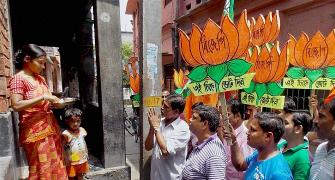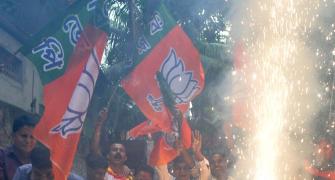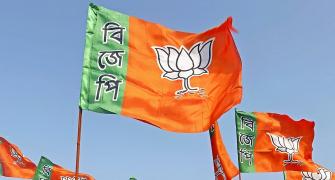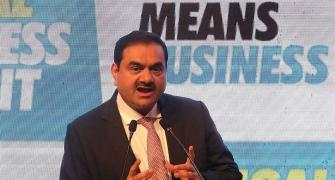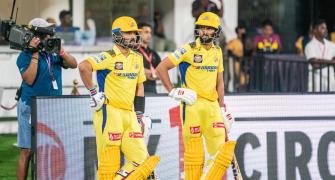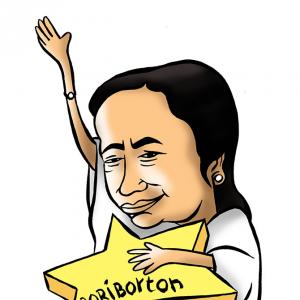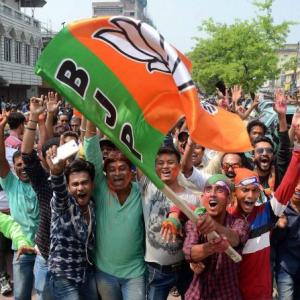State party leaders admit that Hindu consolidation by itself was not good enough to unseat Didi. Radhika Ramaseshan reports.

'Saffron' or 'secular'? The dilemma facing the Bharatiya Janata Party in West Bengal arises from the state's distinct political traits, some of which the party's central leaders have yet to fathom, accustomed as they are to working with the paradigms evolved in north and west India.
Therefore, in March this year, when the BJP in West Bengal organised serial processions to observe Ram Navami and Hanuman Jayanti, its exertions unleashed violence but left no political imprint on a region that embraced eclectic forms of Hinduism contained in the lives and teachings of Chaitanya Mahaprabhu and Ramakrishna Paramhansa.
Prime Minister Narendra Modi and BJP president Amit Shah realised they needed to connect the BJP with provincial symbols and icons.
The Union culture ministry was directed to assemble a permanent exhibit at Kolkata's National Library, themed around Bankim Chandra Chattopadhyay, Rabindranath Tagore, Syama Prasad Mookerjee and Subhas Chandra Bose, even as Chief Minister and Trinamool Congress leader Mamata Banerjee never missed an opportunity to commemorate Bankim, Tagore and Bose.
However, while competing on the turf of cultural regionalism was relatively simple, the BJP found the going in the other areas tougher.
A senior BJP source said that the 'root' cause was like in Kerala, the West Bengal party had not extricated itself from the Rashtriya Swayamsevak Sangh's clutches, a circumstance that until recently stunted its political growth.
"In the districts bordering Bangladesh, the RSS is stronger than the BJP and willy-nilly, we absorbed the RSS's agenda. But slogans like 'Jai Shri Ram' didn’t leave a popular impact. It was (K N) Govindacharya (the former BJP general secretary and strategist) who advocated the need to relate to 'Vande Mataram', and icons such as Bankim and Swami Vivekananda to find a foothold," the source said.
The BJP spotted green shoots of improvement after losing the little advantage it gained in the 2014 Lok Sabha polls.
It secured two out of 42 seats and polled 17.02 per cent votes then, as against the Trinamool Congress's 34 seats and 39.79 per cent vote share.
Two years later in the assembly elections, the BJP picked up just three of the 294 seats, while its vote share dropped to 10.16 per cent (the Trinamool won 211 seats and got 44.91 per cent votes).
In the assembly by-polls and panchayat elections held after 2016, the BJP beat the Congress and the Left Front to second place, albeit as a distant number two.
Jayprakash Majumder, a former Congressman who helms the BJP's political programmes department, said: "If you see the political dynamics, the BJP's growth has been at the cost of the CPM (Communist Party of India-Marxist) and the Congress and not the Trinamool.
"There's a vacuum in the Opposition and the BJP must accept the challenge. Have we broken Mamata’s stronghold in any poll? No.”
Majumder cited the 2008 and the 2018 panchayat polls to make a point about how the 'several lakh missing' voters (allegedly disallowed from voting) in 2008 got back at the then Left Front government with a 'vengeance' in a subsequent poll.
"In 2008, the CPM's booth-capturing ensured about 6.5 million voters couldn't exercise their franchise. They voted spiritedly against the Left in the 2009 polls where from one, the Trinamool jumped to 19 MPs.
"In the 2018 panchayat polls, Mamata stopped nearly 20 million voters from voting. Almost 34 per cent of the seats went uncontested because nominations were enforced by Mamata. In 2019, even if 50 per cent of these 20 million vote against Mamata, it will be advantage BJP, because the CPM and the Congress are not in a position to leverage," he claimed.
An onerous job on hand? Some in the BJP did not think so.
General secretary Kailash Vijayvargiya, the party's West Bengal minder, said, "Like Tripura, the West Bengal results will be surprising. If there was anger against the Left, there's rage against Trinamool."
Former state unit president Rahul Sinha's understanding was: "The gap you see is because of vote bungling and goondaism, and not popular support."
Although state general secretary Sayantan Basu identified the BJP’s growing organisational spread and a 'youthful' leadership at all tiers as its 'assets' -- 'the average age of our leaders is between 40 and 45', he claimed -- his colleagues conceded the Hindu-Muslim divide will be the party’s leitmotif, in discourse and as strategy.
National secretary Suresh Poojari, who assists Vijayvargiya, said: "The state government and the Trinamool’s approach and functioning are underpinned on discrimination against and appeasement of the Muslims at the cost of the majority," even as Majumder admitted Hindu consolidation by itself was not good enough unless Mamata's Muslim vote bank was 'breached'.
Sukhendu Sekhar Roy, the Trinamool's Rajya Sabha MP and spokesman, acknowledged the BJP’s tactics were worrisome.
"We can't be complacent because while the challenge from the Congress and CPM is political, the BJP is more religious than political and plays on emotions," he said.


